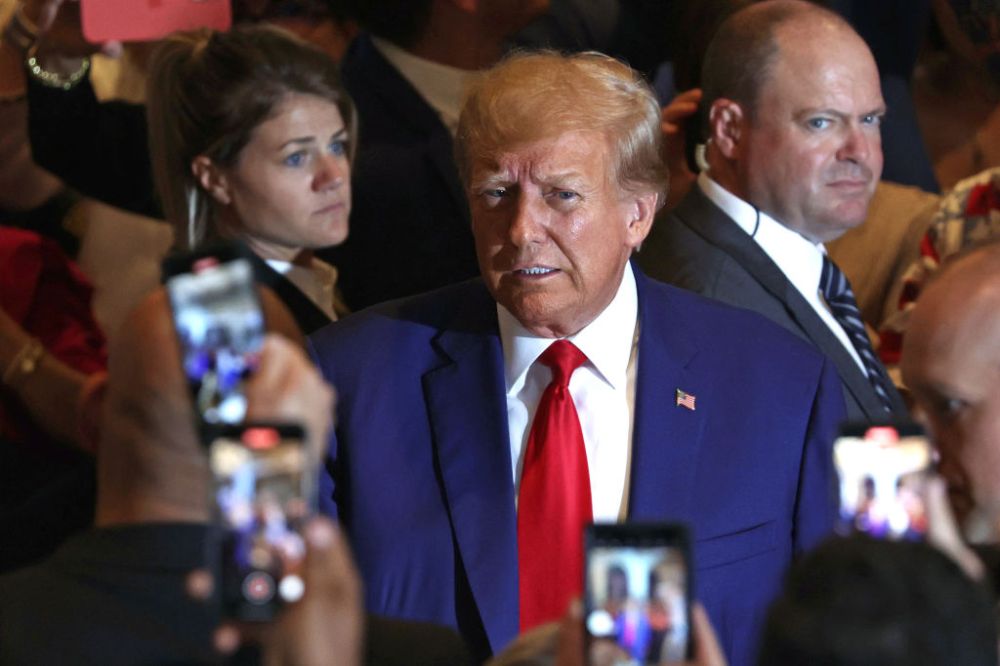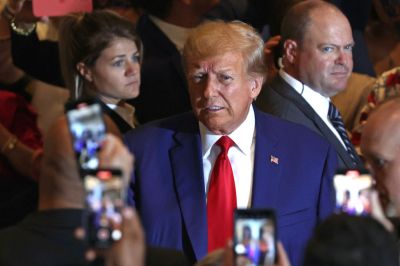Happy Friday! Thought you’d never live to see the word “bro” in a federal indictment involving a former U.S. president? Well, then, this is your lucky day!
Up to Speed
- During remarks at a weekly news conference on Wednesday, Senate Minority Leader Mitch McConnell froze midsentence and remained silent for 19 seconds before Sen. John Barrasso of Wyoming, a physician and the Senate Republican Conference Chairman considered a possible McConnell successor, escorted the Kentucky Republican from the podium. McConnell returned soon after and said, “I’m fine.”
- In March, McConnell fell at a private dinner, sustaining a concussion and a fractured rib, and he fell again on July 14 while disembarking a plane, NBC News reports. McConnell has also used a wheelchair as a precaution in crowded airports. Nevertheless, Sen. John Cornyn of Texas—another potential McConnell successor—said the leader remains “as sharp as he ever was” and insisted he will “support Sen. McConnell as long as he wants to continue to serve.”
- Speaking of elderly U.S. senators: At a Senate Appropriations Committee hearing on Thursday, 90-year-old Sen. Dianne Feinstein appeared confused when called on to vote. Instead of casting a vote in favor of a proposed defense appropriations bill, she began to deliver prepared remarks. Only after an aide whispered in the California Democrat’s ear and Sen. Patty Murray of Washington told her to “just say aye,” did she cast her vote.
- During a chaotic day in a Wilmington, Delaware, courtroom on Wednesday, a plea deal with federal prosecutors that would allow Hunter Biden to avoid jail time fell apart. Prosecutors and Hunter Biden’s lawyer Chris Clark clashed over whether the plea would leave Hunter Biden vulnerable to additional charges, and U.S. District Judge Maryellen Noreika questioned the constitutionality of their agreement. With no deal in place, Hunter Biden pleaded not guilty to all charges.
- During an interview on Wednesday, Florida Gov. Ron DeSantis was asked whether he would consider Robert F. Kennedy Jr. as a running mate. DeSantis answered, “If you're president, you know, sic him on the FDA if he'd be willing to serve or sic him on CDC. But in terms of being veep, if there’s 70 percent of the issues that he may be averse to our base on, that just creates an issue.” In response, former Vice President Mike Pence tweeted, “When I am President, I will only consider Pro-Life Americans to lead FDA, CDC, or HHS. To be clear, pro-abortion Democrats like RFK, Jr. would not even make the list.”
- While interest rate increases have slowed this year, a quarter percentage point increase by the Federal Reserve will bring interest rates to a 22-year high. It is the 11th rate increase since March 2022, when interest rates were near zero.
- Former U.S. Ambassador to Iceland Jeffrey Ross Gunter is expected to announce a run for Senate in Nevada in early August. Gunter, a dermatologist and GOP donor, would join a Republican primary with Jim Marchant, the GOP’s 2022 candidate for Nevada secretary of state, and retired Army Capt. Sam Brown, who has received the National Republican Senatorial Committee’s endorsement and raised over $400,000 in his first week as a candidate.
- Ron Gidwitz, a longtime Illinois Republican activist who was Donald Trump’s state finance chair during his 2016 run, has endorsed Chris Christie for the Republican nomination. “He knows how to work across party lines, which is terribly important as opposed to having a constant battle between Republicans and Democrats,” said Gidwitz. “And he’s the only candidate in the race today who seems to have the courage to call out Donald Trump on the campaign trail.”
Trump and Aides Hit with New Charges in Mar-a-Lago Indictment
In a superseding indictment unsealed by the Justice Department on Thursday, special counsel Jack Smith has brought three additional felony charges against former President Donald Trump in the Justice Department’s classified documents case.
The updated indictment ups the ante on Trump’s legal woes by charging him with two additional counts related to his alleged attempt to destroy surveillance footage with the help of his aide, Walt Nauta, and Mar-a-Lago employee Carlos de Oliveira, who as of Thursday is now a third defendant in the case. Thursday’s indictment also includes a third Espionage Act charge involving Trump’s willful retention of a document involving military plans in Iran after leaving office, and his alleged decision to show the document to individuals who were not authorized to see them.
A Trump campaign spokesman dismissed the charges out of hand as a “desperate and flailing attempt” to undermine the former president amid his reelection bid. Be sure to read today’s Morning Dispatch for a detailed explainer of Thursday’s superseding indictment charges.
What Are Republican Donors Waiting For?
In 2016, wealthy Republican donors jumped into their party’s presidential primary with gusto. There were so many attractive choices—even if their preferred candidate faltered, whoever won the nomination would be someone virtually all of them could celebrate. Then Donald Trump happened.
So this time around, many GOP donors who stroke big checks are hanging back, waiting for a consensus alternative to the former president to emerge organically. They don’t want their money to keep a hopeless candidate in the race and contribute to a split field that greases Trump’s path to a third consecutive nomination.
This category of Republican financier isn’t necessarily looking for a candidate he or she likes or believes in. What they want is a contender who, by the time voting in the primary begins in Iowa in mid-January, is positioned to beat the 45th president. “My guess is, when somebody catches on, you’ll see everybody rallying around them—whoever it is,” says Ron Weiser, a GOP donor in Michigan.
And with Florida Gov. Ron DeSantis running into severe turbulence, a consensus alternative to Trump appears as unpredictable as ever—possibly further waylaying Republican donors looking for a horse to put their muscle behind. “It appeared it was going to be DeSantis and he’s obviously flubbed a few things and is not moving the rope,” Weiser says.
Ironically, Weiser cut against the grain and jumped in early.
He’s backing Nikki Haley, and has donated “six figures” to SFA Fund Inc., the super PAC supporting her 2024 bid. The Dispatch spoke to Weiser and two other early Haley investors—Tim Draper and Mary Tolan—to learn more about why they chose not to keep their powder dry, as are so many other Republican contributors flushed with cash and capable of giving in large amounts. The answers were pretty straightforward.
All three were impressed by Haley, and are convinced the former South Carolina governor and former U.S. ambassador to the United Nations would make a great president. “Nikki checks all the boxes,” says Draper, a venture capitalist from California’s Silicon Valley who donated $1.25 million to SFA Fund Inc.
And, as Tolan, a longtime Republican donor from Chicago, explains: “If you want to sit back and wait, you’re going to get dealt the hand you’re dealt with. I always like to be more proactive and try to encourage better options, and that’s why I decided to support her early.”
Nonetheless, Tolan concedes, just as Weiser does, that most Republican donors broadly are searching for the candidate who can loosen Trump’s iron grip on the GOP (he is lapping the field with 52.4 percent in national averages) and are prepared to back whomever appears to have the best chance to do that.
“There’s a strong conviction with people that are donors that it’s time to move on and they’re going to rally around the right candidate at the right time,” says Tolan, who backed former Florida Gov. Jeb Bush in 2016 but contributed to Trump’s reelection bid in 2020. “People getting involved in the race now are more entrepreneurial.”
A Short-Staffed Biden Campaign Deliberately Keeping Spending Low
The financial fight for the Republican presidential nomination has pulled media attention away from President Joe Biden, whose short-staffed reelection operation spent just over $1 million in the second quarter of 2023 since the president’s April reelection launch. The Biden campaign and the Democratic National Committee reported bringing in a joint $72 million in the second quarter.
The Biden camp is touting its slow burn rate as a deliberate effort to conserve resources alongside a well-funded DNC that has staffed up in all fifty states in preparation for a tough general election campaign.
“We as a Democratic Party infrastructure—the DNC and President Biden’s campaign—are just in a really, really strong position to take on whoever is the nominee next year,” a DNC official tells The Dispatch. “To be very clear, as the DNC is able to carry a lot of that weight and spend money on developing opposition research, on a robust communication structure to define Republicans earlier than ever before.”
The official campaign staff are working out of the DNC headquarters but are planning on moving to Wilmington, Delaware, soon, the DNC official added. The Biden campaign had just four people on its payroll through the second quarter.
Biden allies maintain publicly that it’s wise for the president’s campaign team to keep millions on reserve at this stage in the race. “I think it’s smart as hell,” says former Democratic Sen. Doug Jones of Alabama. “They have a plan, and they have a timeline, and they know exactly what they’re doing. And right now, they are raising money hands over fist and conserving that money now for later use.”
The power of incumbency gives Biden much more breathing room on the spending front compared to his Republican counterparts, given he faces no serious Democratic primary competition from vaccine skeptic Robert F. Kennedy Jr. or self-help author Marianne Williamson. Adding to their confidence is all the drama that’s unfolding on the Republican side of the aisle that Democrats believe will play to Biden’s favor in a general election, especially if Trump wins the nomination.
“It’s a very complicated environment for Democrats, because there’s so much chaos going on on the other side that Democrats can hardly get a word in edgewise,” says former Democratic Rep. Donna Edwards of Maryland. “But it’s bad chaos, and so that may work to Democrats’ advantage.”
Notable and Quotable
“What we believe is that there are unexplained aerial phenomena that have been cited and reported by pilots, Navy and Air Force, and that these phenomena have in some cases had an impact on our pilots' ability to fly, train, operate, and stay ready.”
—National Security Council Coordinator John Kirby at the White House press briefing, Wednesday, July 26








Please note that we at The Dispatch hold ourselves, our work, and our commenters to a higher standard than other places on the internet. We welcome comments that foster genuine debate or discussion—including comments critical of us or our work—but responses that include ad hominem attacks on fellow Dispatch members or are intended to stoke fear and anger may be moderated.
With your membership, you only have the ability to comment on The Morning Dispatch articles. Consider upgrading to join the conversation everywhere.